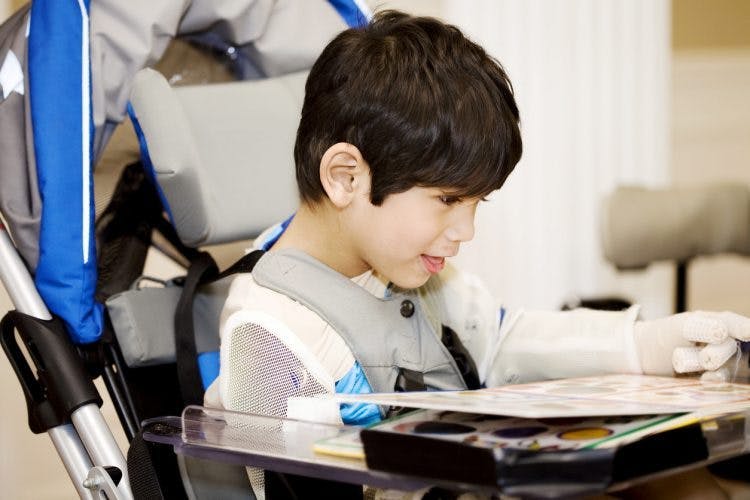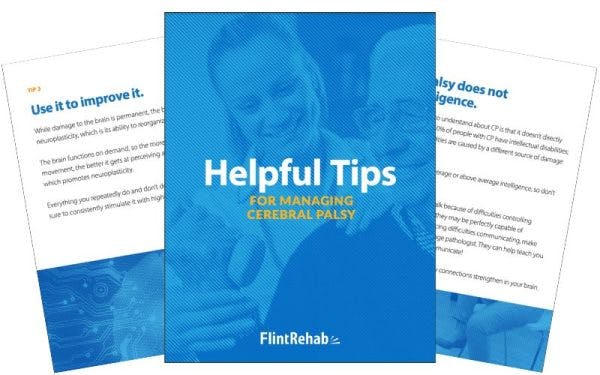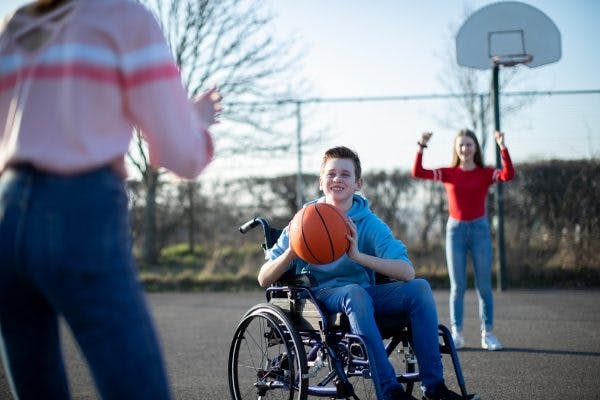Does cerebral palsy affect intelligence? Not directly. Generally, cerebral palsy only affects motor skills such as movement, balance, and posture. However, intellectual disabilities can co-occur with cerebral palsy.
To help you understand the connection between cerebral palsy and intellectual disabilities, this article will discuss:
- Does cerebral palsy affect intelligence?
- Signs of an intellectual disability
- How motor impairment can be mistaken for intellectual impairment
- Management interventions
Does Cerebral Palsy Affect Intelligence?
Cerebral palsy is a neurologically-based motor disability. Individuals with cerebral palsy have sustained brain damage to areas of the brain associated with movement. This damage results in impaired motor skills, such as irregular movements, high or low muscle tone, and poor posture. However, up to 50% of individuals with cerebral palsy also experience intellectual impairments.
Intellectual disabilities are an associative condition of cerebral palsy, which means the two conditions often occur together. However, cerebral palsy and intellectual disability are not directly related because they are caused by damage to two separate areas of the brain.
Cerebral palsy is caused by damage to areas of the developing brain that regulate movement, including the motor cortex, thalamus, basal ganglia, and/or cerebellum. When an individual with cerebral palsy has an intellectual disability, it is because areas of the brain associated with cognitive functioning are also damaged.
Generally, intellectual disabilities are more common amongst individuals with more severe forms of cerebral palsy. This is because more severe motor impairments are associated with greater amounts of damage to the brain.
To understand how to identify an intellectual disability in individuals with cerebral palsy, the following section will discuss common signs.
Signs of an Intellectual Disability

While cerebral palsy does not cause intellectual disability, the two conditions co-occur often enough that it’s worth being aware of potential signs of impaired cognition. The sooner an intellectual disability is diagnosed, the earlier therapeutic intervention can begin.
Intellectual disabilities can present themselves differently in each individual. Depending on the severity of the brain damage, intellectual disabilities can be mild (IQ 50-70), moderate (IQ 36-49), severe (IQ 20-35), or profound (IQ below 20). Milder intellectual impairments may go unnoticed in young children and become more apparent as they get older.
Signs of intellectual disability include:
- Difficulties communicating
- Delayed responses
- Poor memory
- Emotional outbursts
- Difficulties with logical thinking and problem-solving
- Developmental delays (language, crawling, walking, etc.)
- Avoiding social interaction
- Poor concentration
- Inability to recognize familiar voices or faces
- Difficulty processing auditory or visual stimuli
While these signs aren’t absolute indicators of an intellectual disability, they can serve as a sign to speak with your child’s doctor for an official diagnosis. Early intervention may prevent the development of problematic behaviors like self-harm and aggression.
Up next, we’ll discuss how motor impairments can be mistaken for an intellectual disability.
Measuring Intelligence in Children with Cerebral Palsy

Often, an individual’s motor impairments can cause them to struggle with communication despite having completely normal intellectual capacity. Therefore, it is essential to make accommodations to accurately identify if an individual with cerebral palsy has impaired intelligence.
To diagnose an intellectual disability, children are often asked to take a cognitive assessment. However, many pediatric cognitive assessments can cause children with cerebral palsy to score much lower than their actual intellectual capacity because their motor impairments are not accounted for.
For example, children with impaired oral motor skills may not perform well on a verbal subscale, and children with poor fine motor skills may not be able to point to objects or fill in answers accurately. Therefore, a traditional cognitive assessment may not provide the best measure of a child’s cognitive abilities.
When testing children with cerebral palsy for cognitive impairments, it’s essential to consider their motor impairments. This may involve having them take a completely different type of test or allowing more time to complete it.
In the following section, we’ll discuss various interventions that may help children with cerebral palsy manage their intellectual disabilities.
Managing Intellectual Disabilities in Children with Cerebral Palsy
While an intellectual disability can interfere with an individual’s ability to interact with their surroundings and care for themselves, there are management interventions that can help significantly improve one’s quality of life.
Management for intellectual disabilities in individuals with cerebral palsy may include:
Educational Assistance
Educational assistance can help provide the personalized support and attention your child needs to succeed academically. Legally, schools must provide reasonable accommodations (often through an Individualized Education Program, or IEP) to help individuals with intellectual disabilities learn and succeed.
Speech Therapy
Speech therapy techniques can help individuals develop their articulation, listening, and receptive language skills. If someone with cerebral palsy is non-verbal, a speech-language pathologist may teach them how to use augmentative and alternative communication methods to improve their communication skills. They may also help individuals learn ways to improve or compensate for cognitive difficulties.
Occupational Therapy
Occupational therapy focuses on developing an individual’s functional independence. This may involve practicing everyday activities or learning how to use adaptive tools to compensate for restricted movements.
Physical Therapy
Physical therapy focuses on improving an individual’s motor functions through the repetitive practice of targeted exercises. While this mainly addresses motor improvement, it’s an essential part of cerebral palsy management that can help improve overall quality of life.
Cognitive Behavioral Therapy
Cognitive behavioral therapy focuses on improving negative thought patterns, such as those associated with depression and anxiety, which those with cerebral palsy and intellectual disabilities may experience. Additionally, it focuses on identifying problem behaviors and replacing them using positive reinforcement. This can promote improved skills in areas such as communication and problem-solving.
Everyone experiences cerebral palsy and intellectual impairments differently. Participating in various management interventions will provide your child with the personalized care they need to address their specific weaknesses.
Cerebral Palsy and Intelligence: Key Points
While cerebral palsy does not affect intelligence, many individuals with CP experience co-occurring intellectual disabilities. However, the two conditions are caused by damage to two separate areas of the brain. With the right support and management, individuals with intellectual disabilities can learn how to maximize their independence and engage in everyday life.










